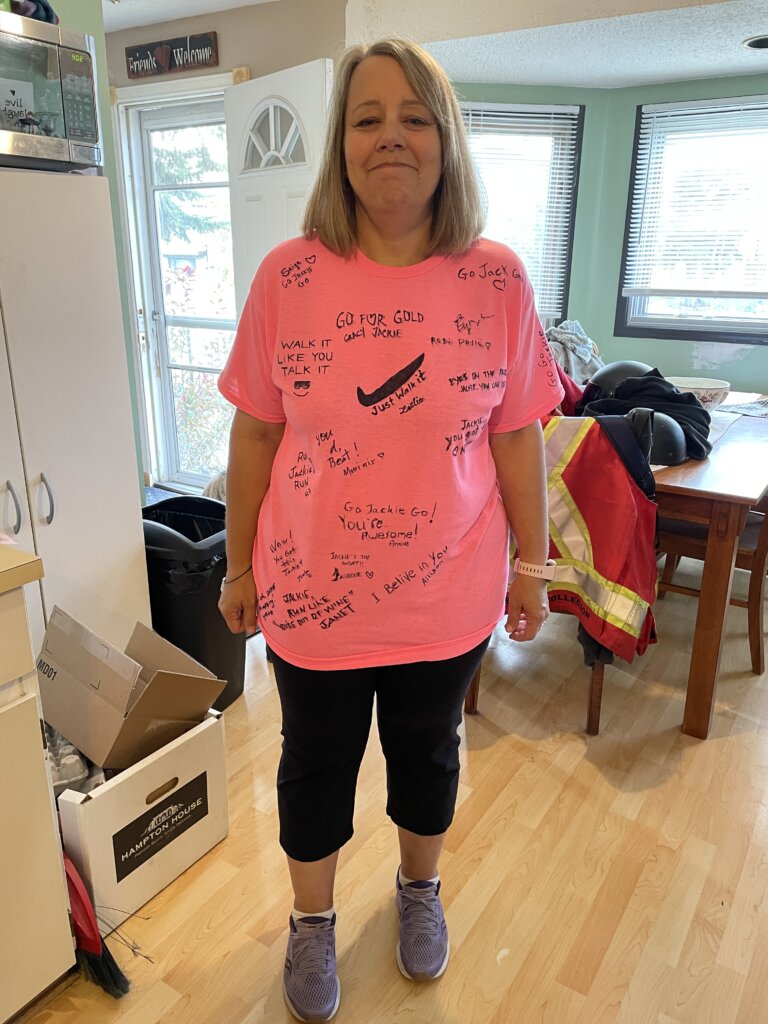Il y a près de sept ans, on a diagnostiqué chez Jackie Kelly une cholangite biliaire primitive (CBP), secondaire à une cirrhose non alcoolique. Jackie, 53 ans, vit à Calgary, est mariée depuis dix-neuf ans à son mari et travaille dans le secteur de la santé en tant que phlébotomiste, ce qui la met involontairement en contact avec des patients qui ont également été diagnostiqués avec une maladie du foie. Jackie a trois frères et sœurs, dont l'un a reçu un diagnostic de CBP, et son père, qui a reçu un diagnostic de cholangite sclérosante primitive (CSP) et a bénéficié d'une greffe de foie au cours de son parcours avec la maladie du foie. Jackie connaît bien les maladies du foie et l'impact durable qu'elles ont, non seulement sur l'individu, mais aussi sur son système de soutien et ses proches.

Avant son diagnostic, les symptômes de Jackie ont d'abord été attribués à la nécessité d'un pontage gastrique, une intervention chirurgicale qu'elle avait subie avant de découvrir qu'elle était atteinte de CBP. Depuis que son père a été diagnostiqué, elle s'est fixé comme priorité de prendre des rendez-vous annuels pour vérifier ses enzymes hépatiques. Trois mois après avoir découvert que ses enzymes hépatiques avaient grimpé en flèche en 2016, Jackie avait déjà consulté un spécialiste du foie.
Au cours de la première année qui a suivi le diagnostic, Jackie a été hospitalisée tous les mois pour des endoscopies visant à colmater des varices et a finalement subi une intervention TIPS en raison d'une hémorragie importante. Cette intervention consiste à insérer un stent pour réduire la pression du sang circulant dans le foie afin d'arrêter les saignements et les remontées de liquide.
Même si elle ressent des émotions fortes, si elle est très enflée, si sa capacité à se souvenir de certaines choses a changé et si elle est parfois confuse, Jackie reste positive et légère face à sa maladie. Après avoir parlé avec son médecin de la recherche d'un donneur vivant, Jackie envisage l'avenir avec l'espoir d'une meilleure qualité de vie grâce à une greffe de foie.
Les effets de la maladie chronique du foie ont ralenti Jackie comme elle ne l'avait jamais fait et ont entraîné des changements considérables dans sa vie quotidienne. Les craintes réelles liées à la perte d'indépendance pour conduire ou à la régularité de sa vie professionnelle sont des choses dont Jackie s'inquiète pour l'avenir.
En tant que défenseur des personnes atteintes d'une maladie du foie, Jackie s'efforce de partager son histoire dans l'espoir que plus il y aura de personnes prêtes à faire de même, plus il y aura de chances d'inciter les gens à signer leur carte de donneur et de braquer les projecteurs sur les maladies du foie. Avec une lumière plus vive, Jackie espère que les personnes qui hésitent à faire un don d'organe seront mieux informées. Compte tenu du grand nombre de personnes atteintes d'une maladie du foie et dont beaucoup ont besoin d'une transplantation, Jackie est passionnée par le don d'organes et les opérations chirurgicales qui sauvent des vies chaque jour.

